From the breakdown of supply chains of their produce to high transportation costs, the pandemic has been severe on the farmers. The distress they are in demands community support. As Hill Farmers’ Union president, Commander Shangpliang said: “Farmers are the rice bowl of the country and supporting them will go a long way in boosting the economy.”
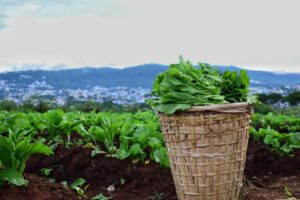
The slump in the country’s economy has impacted the farmers acutely, apparent across the spectrum from traditional farmers to entrepreneurs with green ventures. Sunday Shillong brings to you snippets from the ground and the resilience shown by some farmers.
Distressed Farmers
In the wake of the pandemic-induced lockdown, the lack of access to market spaces to sell their agricultural produce has weighed heavy on the community. The farmers have always had to come to grips with issues such as weather conditions, soil and pests but the past year-and-a-half has stretched them far too thin.
Banker Nongrum from Ksehpyndeng, Mawryngkneng in East Khasi Hills district said, “We are facing a lot of problems since COVID-19 struck in the state in March-April 2020. The rise in the prices of essential commodities along with transport cost has been tough.”
Market restrictions have robbed their perishable produce of sufficient time to be sold. “We are able to sell only six out of fifteen baskets of our agricultural produce to the local markets. The remaining baskets are invariably thrown away since they perish in no time. Sometimes we return the vegetables to the farmers or give it to those involved in livestock farming,” he said.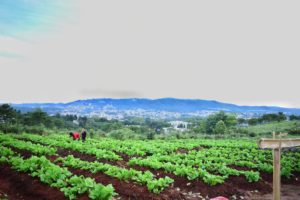
The poor business has invited pressure from the lenders. “We are constantly sent reminders from the banks to repay our loans. The only relieving factor is that the principal amount has been waived off for the farmers and we need to pay only the interest,” a farmer from Lumkhriem said.
The temporary relief hasn’t translated into more investment in the fields for better production and business. Many farmers are facing problems repaying the interest since their income has gone down drastically. “We have cut down on cultivation as the markets have been mostly closed due to COVID-19 restrictions. Costlier pesticides and transportation have not helped either,” he said.
Hamsterly Rympei, another farmer from Pynthor village in the Umroi area of Ri-Bhoi district said they have had to sell their farm produce at throwaway prices at the nearby vegetable markets. “The big retailers are exploiting the situation,” he said.
“We are cultivating ginger and vegetables such as tomatoes, cauliflowers and potatoes. We are not even able to recover the transportation charges, let alone make a profit,” Rympei lamented.
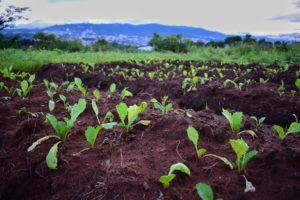 Kimbretta Khongwir, the head of Zizira said: “With the pandemic and subsequent lockdowns being imposed, farmers are having an even harder time finding a market for their produce. It is extremely saddening to hear accounts of farmers not being able to feed their families, let alone make ends meet as they are reliant on daily earnings. Many have their perishable goods just rotting and going to waste.”
Kimbretta Khongwir, the head of Zizira said: “With the pandemic and subsequent lockdowns being imposed, farmers are having an even harder time finding a market for their produce. It is extremely saddening to hear accounts of farmers not being able to feed their families, let alone make ends meet as they are reliant on daily earnings. Many have their perishable goods just rotting and going to waste.”
Entrepreneurial Woes
At an age and time when most do not view farming as an attractive and lucrative profession, two entrepreneurs using sustainable farming techniques have raised farms comprising new-age superfoods called microgreens. Taking traditional farming a notch higher, Riyaki Jana’s Big Little Greens and Andrew Suting’s Simple Green Foods pursue a refreshing pathway to nutritious baby greens. With an array of exotic herbs
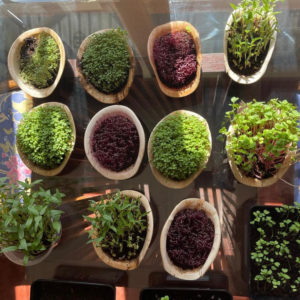
and vegetables such as basil, fennel, dill, tatsoi, pakchoi, arugula, lettuce, Tuscan kale, edible flowers, cherry tomatoes, sage, lavender, their endeavour has been to utilise the abundance of natural resources present in the state while promoting ecologically sustainable mechanisms.
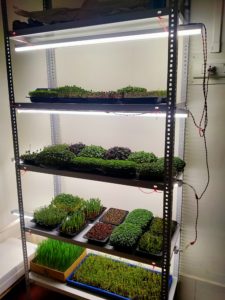
Filling up for the void in what is typically available in a grocer’s market, Riyaki’s passion for farming began from the idea of eating what you grow and the increasing health consciousness in this current generation. “I started with microgreens, even though small but are highly nutritious and delicious. They are incredibly pleasing to the eye and can be eaten just as they are or even sprinkled on a plate of homecooked food,” she said.
Andrew’s passion for clean, healthy, and homegrown produce has been the foundation of his venture. Conscious of environmental concerns, he said: “Preserving is what I try to practice. The equipment that I use in my urban farm are recycled, repurposed and home built. For instance, the hydroponic system that I have built uses 90% less water than what is actually used in traditional farming. I repurpose old trays to grow seedlings and I’m also planning to move towards solar energy.”
The challenges have been tough. “It was quite a challenge during the second lockdown with regards to microgreens, as the commercial clients I regularly supply to had to stop work. Times like these are definitely a bane to all farmers and society as a whole,” Andrew said.
Efforts towards Alleviation
Across the spectrum of farming communities, the hardships of the lockdown have run deep, albeit in different quantum. In light of the problems, measures have been taken at the policy level as well as by some good Samaritans to alleviate the situation.
In a one-of-a-kind initiative, 1917ITeams, a platform functioning since 2017 that provides access to markets, driven with the objective to provide a consistent response to farmers, has been playing a prominent role. “Our goal has been not only to ease their pain concerning their produce but also to unite them. Elaborating on some of the extensive tasks undertaken by their team,” Shangpliang said.
“We have been educating our farmers about the different schemes and sharing information via WhatsApp groups. This helps a farmer in Nongpoh know the market price of a vegetable being sold in Iewduh and prevent any possible losses,” he added.
The state government and the department concerned have been proactive in mitigating the problems faced by the farmers through initiatives such as allowing farming activities to continue with adherence to COVID-19 guidelines, distributing seeds to farmers during the planting season at a subsidised cost, issue passes for seed dealers and agents to distribute seeds to farmers and distributors, opening authorised seed shops to sell seeds and agriculture inputs, providing transport service through 1917ITeams with vehicles passes issued by the DC for farmers to sell to the designated markets in cities and towns.
The government has also tried to step in to help the farmers during the lockdown by setting up temporary wholesale markets across the state such as the Anjalee Cinema parking lot, Demseiniong, Umphyrnai, 5th Mile, 7th Mile and Shilliang Um.
On benefitting from the different sources and aids sent out, Ri-Bhoi farmer Rympei said: “I am yet to receive any kind of assistance from the government. But we have been receiving some assistance from ICAR, Umiam with regards to providing vegetables seeds and pesticides.”
The self-funded like Simple Green Foods have faced lockdown difficulties too. “Now with things gradually opening up, I’m optimistic about better days and better times for everyone,” Andrew said.
Riyaki would rather focus on the positives of a difficult phase. “The time has given me the opportunity to strengthen and expand my knowledge in this field and understand the local market. Moreover, the budding of online platforms during the pandemic has led to innovation and change in the local shopping experience and helped me reach our customers even during these difficult times.”
 Based on her expertise in her field, Khongwir said: “Meghalaya is still very much untapped and has a lot to offer. Additionally, our farming traditions along with our farmers’ age-old wisdom handed down orally over generations can be shared with others.”
Based on her expertise in her field, Khongwir said: “Meghalaya is still very much untapped and has a lot to offer. Additionally, our farming traditions along with our farmers’ age-old wisdom handed down orally over generations can be shared with others.”
Jayanta Layek, an ICAR scientist handling Agronomy, said: “The integrated farming system is the most viable option for sustainable food, nutritional and rural livelihood security especially for small and marginal farmers because it integrates enterprises such as fruits and vegetables, livestock, poultry, fish, multipurpose tree species, mushroom, and helps generating more income during such times.”
Whether the blend of traditional and modern farm practices can bail out the farmers from the pandemic-induced hardships is a matter of time. Being “vocal for local” and buying their produce can certainly help.
By Esha Chaudhuri
(With inputs from Lamphrangbor Nongspung)



